新概念第二册50课时
- 格式:ppt
- 大小:2.20 MB
- 文档页数:14
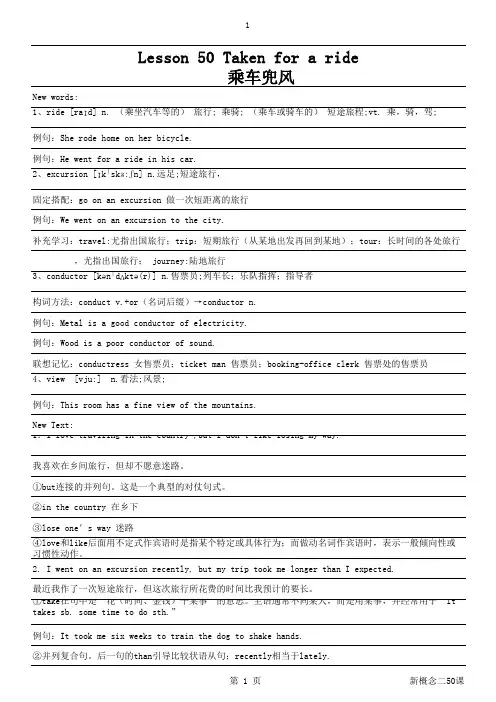
Lesson 50 Taken for a ride乘车兜风New words:1、ride [raɪd] n. (乘坐汽车等的) 旅行; 乘骑; (乘车或骑车的) 短途旅程;vt. 乘,骑,驾;例句:She rode home on her bicycle.例句:He went for a ride in his car.2、excursion [ɪkˈskɜ:ʃn] n.远足;短途旅行,固定搭配:go on an excursion 做一次短距离的旅行例句:We went on an excursion to the city.补充学习:travel:尤指出国旅行;trip:短期旅行(从某地出发再回到某地);tour:长时间的各处旅行 ,尤指出国旅行; journey:陆地旅行3、conductor [kənˈdʌktə(r)] n.售票员;列车长;乐队指挥;指导者构词方法:conduct v.+or(名词后缀)→conductor n.例句:Metal is a good conductor of electricity.例句:Wood is a poor conductor of sound.联想记忆:conductress 女售票员;ticket man 售票员;booking-office clerk 售票处的售票员4、view [vju:] n.看法;风景;例句:This room has a fine view of the mountains.New Text:1.I love travlling in the country ,but I don't like losing my way.我喜欢在乡间旅行,但却不愿意迷路。
①but连接的并列句。
这是一个典型的对仗句式。
②in the country 在乡下③lose one's way 迷路④love和like后面用不定式作宾语时是指某个特定或具体行为;而做动名词作宾语时,表示一般倾向性或习惯性动作。

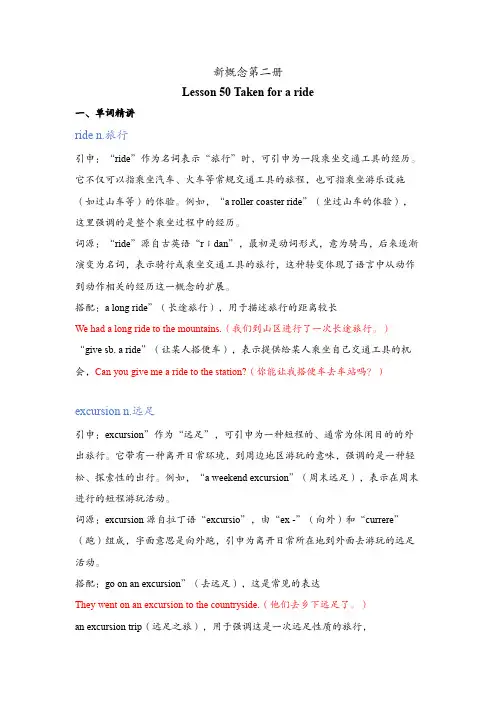
新概念第二册Lesson 50 Taken for a ride一、单词精讲ride n.旅行引申:“ride”作为名词表示“旅行”时,可引申为一段乘坐交通工具的经历。
它不仅可以指乘坐汽车、火车等常规交通工具的旅程,也可指乘坐游乐设施(如过山车等)的体验。
例如,“a roller coaster ride”(坐过山车的体验),这里强调的是整个乘坐过程中的经历。
词源:“ride”源自古英语“rīdan”,最初是动词形式,意为骑马,后来逐渐演变为名词,表示骑行或乘坐交通工具的旅行,这种转变体现了语言中从动作到动作相关的经历这一概念的扩展。
搭配:a long ride”(长途旅行),用于描述旅行的距离较长We had a long ride to the mountains.(我们到山区进行了一次长途旅行。
)“give sb. a ride”(让某人搭便车),表示提供给某人乘坐自己交通工具的机会,Can you give me a ride to the station?(你能让我搭便车去车站吗?)excursion n.远足引申:excursion”作为“远足”,可引申为一种短程的、通常为休闲目的的外出旅行。
它带有一种离开日常环境,到周边地区游玩的意味,强调的是一种轻松、探索性的出行。
例如,“a weekend excursion”(周末远足),表示在周末进行的短程游玩活动。
词源:excursion源自拉丁语“excursio”,由“ex -”(向外)和“currere”(跑)组成,字面意思是向外跑,引申为离开日常所在地到外面去游玩的远足活动。
搭配:go on an excursion”(去远足),这是常见的表达They went on an excursion to the countryside.(他们去乡下远足了。
)an excursion trip(远足之旅),用于强调这是一次远足性质的旅行,We are planning an excursion trip to the beach.(我们正在计划一次去海滩的远足之旅。
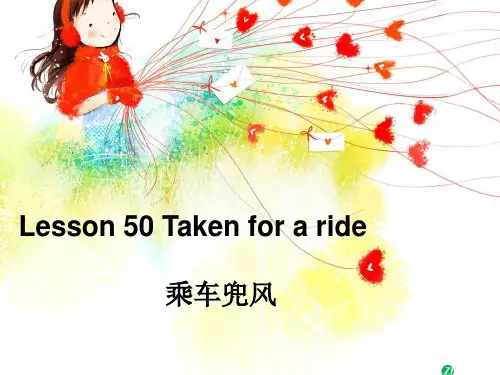
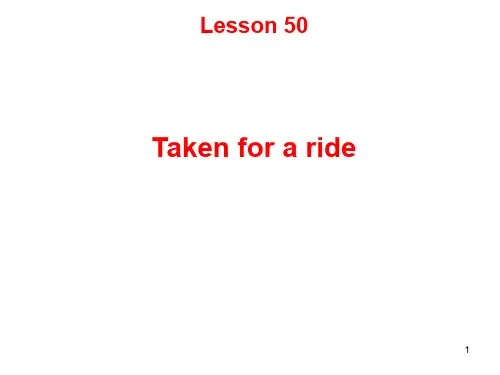
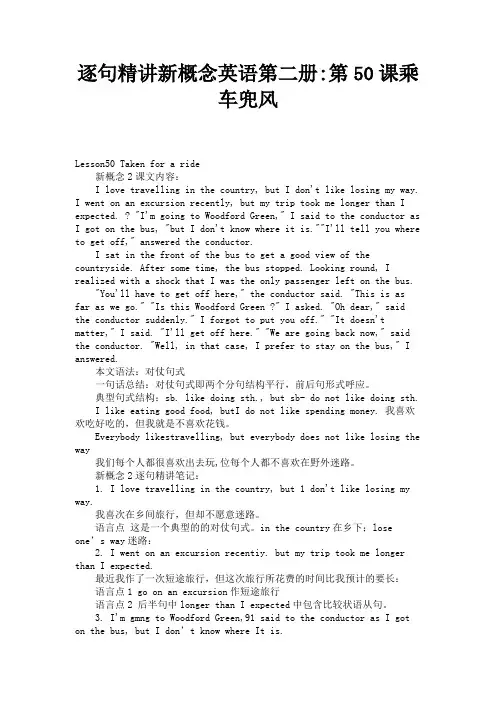
逐句精讲新概念英语第二册:第50课乘车兜风Lesson50 Taken for a ride新概念2课文内容:I love travelling in the country, but I don't like losing my way.I went on an excursion recently, but my trip took me longer than I expected. ? "I'm going to Woodford Green," I said to the conductor as I got on the bus, "but I don't know where it is.""I'll tell you where to get off," answered the conductor.I sat in the front of the bus to get a good view of the countryside. After some time, the bus stopped. Looking round, I realized with a shock that I was the only passenger left on the bus."You'll have to get off here," the conductor said. "This is asfar as we go." "Is this Woodford Green ?" I asked. "Oh dear," said the conductor suddenly." I forgot to put you off." "It doesn't matter," I said. "I'll get off here." "We are going back now," said the conductor. "Well, in that case, I prefer to stay on the bus," I answered.本文语法:对仗句式一句话总结:对仗句式即两个分句结构平行,前后句形式呼应。
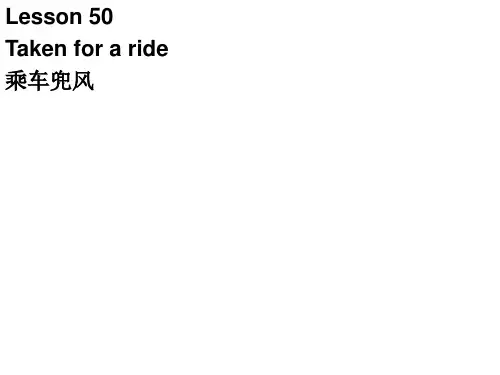
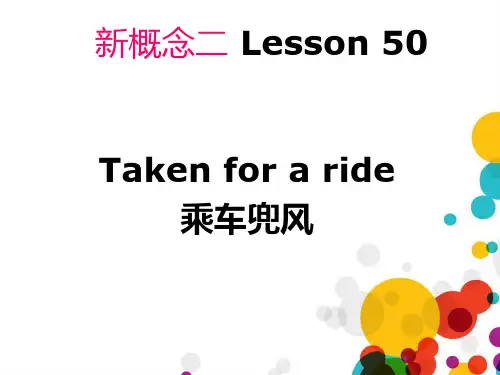
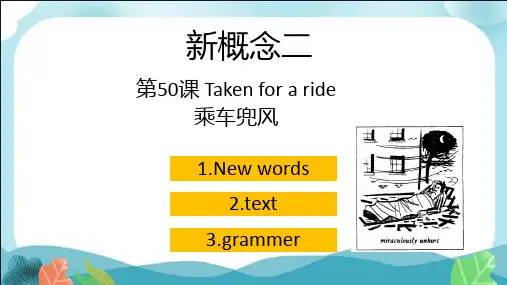

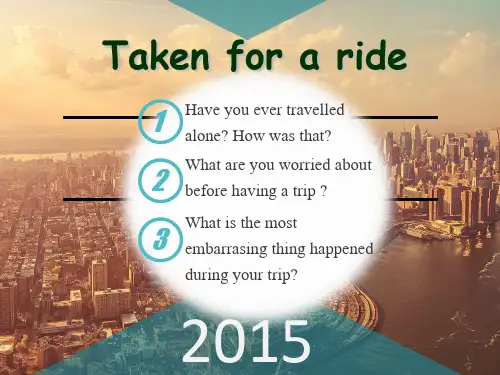
TextI love travelling in the country, but I don't like losing my way.I went on an excursion recently, but my trip took melonger than I expected.'I'm going to Woodford Green,' I said to the conductor as I got on the bus, 'but I don't know where it is.''I'll tell you where to get off.' answered the conductor.I sat in the front of the bus to get a good view of the countryside. After some time, the bus stopped. Looking round, I realized with a shock that I was the only passenger left on the bus.'You'll have to get off here,' the conductor said. 'This is as far as we go.''Is this Woodford Green?' I asked.'Oh dear,' said the conductor suddenly. 'I forgot to put you off.''It doesn't matter,' I said. 'I'll get off here.''We're going back now,' said the conductor.Taken for a ride 被当作是乘车兜风take for 把…认为是,把…看成为;take sb for a ride 欺骗某人, 诈骗某人标题相关 1乘车兜风2我被骗了I love travelling in the country, but I don't like losing my way.我喜欢在乡间旅行, 但却不愿意迷路.love to do一次性喜欢like to do一次性喜欢prefer to do一次性喜欢love doing长期性喜欢like doing长期性喜欢prefer doing长期性喜欢love to do 想要做某事love doing 喜欢做enjoy doing 喜欢做eg Love me , love my dog. 爱屋及乌lose one’s way 迷路;lose one’s job 失业lose one’s face 丢脸lose one’s temper 失去控制,发脾气lose weight减肥put on weight 增加体重、加胖lose one’s cool 沉不住气、失控发火keep one’s cool保持镇定lose one’s head 昏了头,冲动keep one’s shirt on 保持冷静;lose one’s life丧命lose one’s breath 喘不过气来,呼吸困难、喘息,上气不接下气lose oneself 沉迷于eg He lost himself in reading . 他沉迷于读书.区别 lose , loose , misslose [lu:z] v丢失;迷失(lost - lost)eg I don’t like losing my way.我不喜欢迷路。
新概念英语第二册第50课:Taken for a rideLesson 50 Taken for a ride乘车兜风 First listen and then answer the question.听录音,然后回答以下问题。
Why did the writer not get off the bus at Woodford Green?I love travelling in the country, but I don't like losing my way.I went on an excursion recently, but my trip took me longer than I expected.'I'm going to Woodford Green,' I said to the conductor as I got on the bus, 'but I don't know where it is.''I'll tell you where to get off.' answered the conductor.I sat in the front of the bus to get a good view of the countryside. After some time, the bus stopped. Looking round, I realized with a shock that I was the only passenger left on the bus.'You'll have to get off here,' the conductor said. 'This is as far as we go.''Is this Woodford Green?' I asked.'Oh dear,' said the conductor suddenly. 'I forgot to put you off.' 'It doesn't matter,' I said. 'I'll get off here.''We're going back now,' said the conductor.'Well, in that case, I prefer to stay on the bus,' I answered.参考译文我喜欢在乡间旅行,但却不愿意迷路。